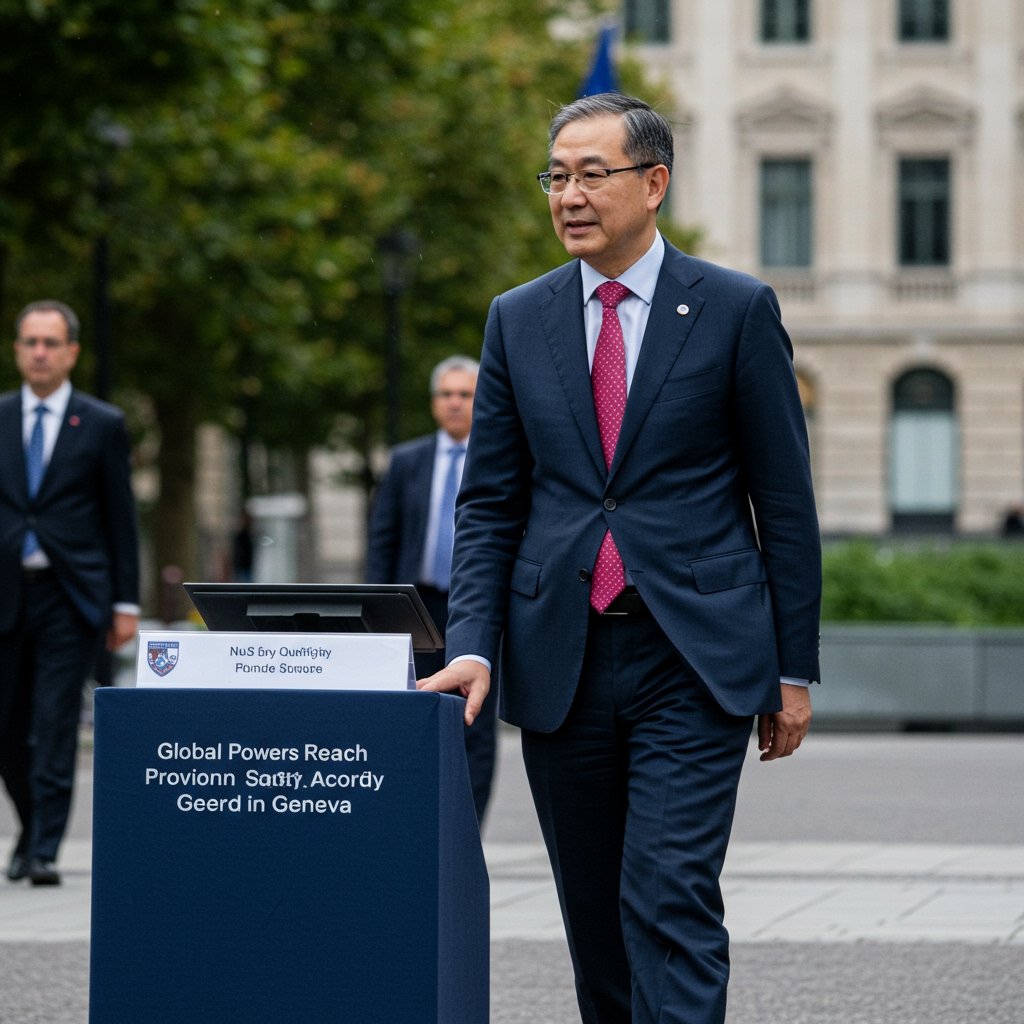Global Powers Reach Provisional AI Safety Accord in Geneva
Geneva, Switzerland – In a significant development for international governance of artificial intelligence, representatives from the G20 nations, spearheaded by negotiators from the European Union and the United States, today announced a provisional accord on international artificial intelligence safety standards. The agreement, the culmination of a week of intensive discussions held in Geneva, Switzerland, marks a crucial step towards establishing a unified global approach to mitigating the potential risks posed by advanced AI systems. While the path to formal implementation remains, the provisional pact lays down foundational principles and mechanisms intended to guide the responsible development and deployment of AI technologies worldwide.
Details of the Provisional Agreement
The accord reached in Geneva outlines several key pillars designed to create a baseline for managing the inherent complexities and risks associated with increasingly sophisticated AI. Negotiators focused on areas deemed critical for ensuring both safety and public trust in AI systems. The three primary components of the provisional agreement include mandates for pre-deployment safety testing, specific data privacy protocols tied to large-scale training datasets, and the establishment of a joint international body tasked with monitoring compliance with the agreed-upon standards.
Key Pillars of the Accord
The first major provision established by the agreement is the requirement for mandated pre-deployment safety testing of advanced AI systems. This stipulation aims to ensure that potential risks, biases, and vulnerabilities are identified and addressed before these systems are released for public or widespread use. The specifics of what constitutes adequate testing are expected to be detailed in subsequent technical annexes, but the principle of mandatory evaluation prior to deployment is a central tenet of the pact. This reflects a growing international consensus that the rapid pace of AI innovation necessitates proactive safety measures rather than reactive responses to incidents.
Complementing the safety testing requirement are stringent data privacy protocols for training sets exceeding 1 petabyte. Recognizing that large datasets are fundamental to training powerful AI models, the negotiators emphasized the need for robust protections concerning the data used. Datasets surpassing the 1 petabyte threshold are now subject to specific, yet-to-be-fully-defined, privacy safeguards. These protocols are intended to minimize the risk of privacy breaches, misuse of personal data, and the perpetuation of biases present in training data. The focus on datasets exceeding this significant size threshold indicates an emphasis on the ‘advanced’ AI systems mentioned as the target of the agreement, as these typically require vast amounts of data for development.
The third pillar involves the creation of a joint international body to monitor compliance. This body is envisioned as the enforcement arm – or at least, the oversight mechanism – for the newly agreed standards. Its primary role will be to track adherence by nations and potentially relevant entities within those nations to the mandated testing and data privacy protocols. The provisional agreement sets a target date of by 2026 for the establishment and operationalization of this monitoring body. Its structure, membership (likely involving representatives from signatory nations and technical experts), and precise powers are subjects that will require further negotiation and agreement as the accord moves towards formal ratification.
Negotiation Challenges: Enforcement Mechanisms
While the provisional agreement establishes the critical frameworks for safety testing, data privacy, and monitoring, specifics on enforcement mechanisms are still under negotiation. This represents one of the more complex aspects of translating a provisional international accord into actionable and uniformly applied global standards. Questions surrounding how non-compliant nations or entities will be addressed, the legal weight of the monitoring body’s findings, and the interplay between international standards and national sovereignty remain areas requiring detailed resolution in future discussions. The current pact signals intent and establishes requirements, but the practical implementation and consequences of non-compliance are yet to be fully defined.
Significance and Next Steps
The provisional agreement reached in Geneva is widely viewed as a significant milestone in the global effort to govern AI. By bringing together the G20 nations, with active leadership from the European Union and the United States, the pact demonstrates a collective acknowledgment of the need for international cooperation on AI safety. It aims to create a necessary baseline for managing risks from advanced AI systems, preventing a potential race to the bottom in safety standards as countries compete in AI development. Establishing this common ground provides a foundation upon which more detailed regulations and technical specifications can be built in the future.
The next phase involves the process of formal ratification. The pact is expected to be formally ratified by national legislatures starting Q3 2025. This timeline indicates that while an agreement has been reached at the executive and negotiating levels, the standards will require approval through the domestic political processes of each signatory nation. The period between the provisional announcement and the start of ratification allows time for national governments to review the detailed terms, prepare implementing legislation, and engage in further technical discussions. The phased approach to ratification, commencing in Q3 2025, acknowledges the administrative and legislative work required across a diverse group of nations like the G20.
Conclusion
The provisional accord on international AI safety standards announced today in Geneva by the G20 nations, led by the European Union and the United States, represents a landmark moment in global technology governance. By agreeing on initial frameworks for mandated pre-deployment safety testing, data privacy protocols for training sets exceeding 1 petabyte, and a joint international body to monitor compliance by 2026, the international community has taken a concrete step towards cooperatively managing the risks of advanced AI. While challenges remain, particularly regarding the specifics of enforcement mechanisms, the agreement establishes a vital baseline for managing risks and sets the stage for formal ratification by national legislatures starting in Q3 2025. This pact underscores the growing global recognition that ensuring the safety and trustworthiness of AI requires coordinated, international action.






